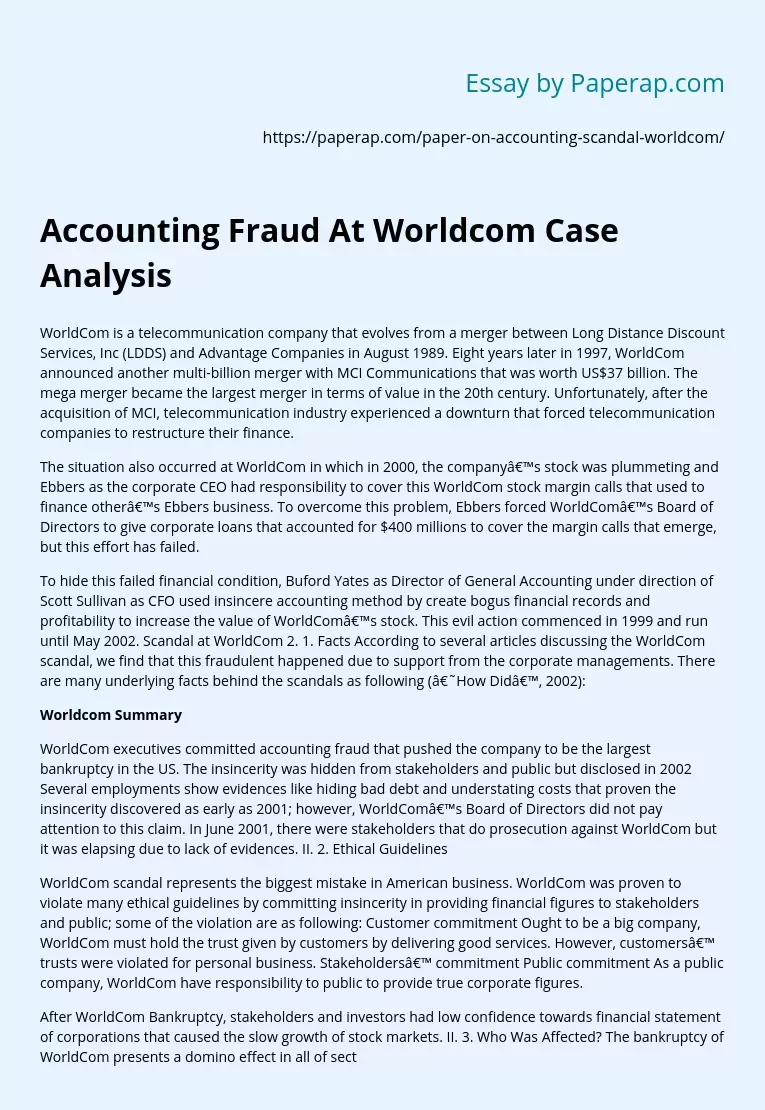Accounting Fraud At Worldcom Case Analysis
WorldCom is a telecommunication company that evolves from a merger between Long Distance Discount Services, Inc (LDDS) and Advantage Companies in August 1989. Eight years later in 1997, WorldCom announced another multi-billion merger with MCI Communications that was worth US$37 billion. The mega merger became the largest merger in terms of value in the 20th century. Unfortunately, after the acquisition of MCI, telecommunication industry experienced a downturn that forced telecommunication companies to restructure their finance.
The situation also occurred at WorldCom in which in 2000, the company’s stock was plummeting and Ebbers as the corporate CEO had responsibility to cover this WorldCom stock margin calls that used to finance other’s Ebbers business.
To overcome this problem, Ebbers forced WorldCom’s Board of Directors to give corporate loans that accounted for $400 millions to cover the margin calls that emerge, but this effort has failed.
To hide this failed financial condition, Buford Yates as Director of General Accounting under direction of Scott Sullivan as CFO used insincere accounting method by create bogus financial records and profitability to increase the value of WorldCom’s stock.
This evil action commenced in 1999 and run until May 2002. Scandal at WorldCom 2. 1. Facts According to several articles discussing the WorldCom scandal, we find that this fraudulent happened due to support from the corporate managements. There are many underlying facts behind the scandals as following (‘How Did’, 2002):
Worldcom Summary
WorldCom executives committed accounting fraud that pushed the company to be the largest bankruptcy in the US. The insincerity was hidden from stakeholders and public but disclosed in 2002 Several employments show evidences like hiding bad debt and understating costs that proven the insincerity discovered as early as 2001; however, WorldCom’s Board of Directors did not pay attention to this claim.
In June 2001, there were stakeholders that do prosecution against WorldCom but it was elapsing due to lack of evidences. II. 2. Ethical Guidelines
WorldCom scandal represents the biggest mistake in American business. WorldCom was proven to violate many ethical guidelines by committing insincerity in providing financial figures to stakeholders and public; some of the violation are as following: Customer commitment Ought to be a big company, WorldCom must hold the trust given by customers by delivering good services. However, customers’ trusts were violated for personal business. Stakeholders’ commitment Public commitment As a public company, WorldCom have responsibility to public to provide true corporate figures.
After WorldCom Bankruptcy, stakeholders and investors had low confidence towards financial statement of corporations that caused the slow growth of stock markets. II. 3. Who Was Affected? The bankruptcy of WorldCom presents a domino effect in all of sector, especially at stocks market and telecommunication services. When WorldCom announced their bankruptcy, share price of Nokia, Sony Ericsson, Vodafone, Alcatel and other telecommunication companies experienced a significant downturn. For example, share price of Nokia experienced five-percent decline, Sony Ericsson descended nine percent, and Vodafone descended 17 percent.
Meanwhile, Alcatel experienced heaviest blow by descending 17 percent momentary gratuities after announcing of expense amputation meaning employees reduction . II. 4. Avoidance and Preventions in Future Most of accounting scandals involve insiders (85% of scandals). Another 55% of accounting scandals also involve high-level managements and company’s executives. All insincerity will generate bad impact for company and company stakeholders. Therefore, it requires some prevention action so that a coming fraudulent can be avoided. There are some ways to avoid the fraud in a company: (Waymark, 2006)
Observe the financial accounting One of important matters is to give more attention to company financial reports. A research finds that companies focus more on asset misappropriations and computer crimes (63%) while deception of financial accounting only 21%. Observing the executives Second way is to observe all company’s executive in the moment of company merger, after promotion, and new market extension. This is because all executives have work and serve company in a long time. However, if we consider facts and results of fraud, we find that executives conduct a lot of fraud in a company.
Reference:
‘How Did WorldCom Go Bankrupt? ’ 2002. Retrieved June 19, 2007 from www. securitiesfraudfyi. com/ ‘Is the backbone broken? ’ 2002. Retrieved June 19, 2007 from http://money. cnn. com/ Midleton, James. 2002. ‘WorldCom domino effect begins’ Retrieved June 19, 2007 from http://www. vnunet. com/vnunet/news/2119227/worldcom-domino-effect-begins” Waymark, Stuart. 2006. ‘Preventing Corporate Fraud: Know and avoid the myths’. Retrieved June 19, 2007 from http://int. sitestat. com/ernst-and-young/south-africa/s? South_Africa_Home. Media. 2006_Press_Releases. 14_Aug_06_Preventing_Corporate_Fraud
Accounting Fraud At Worldcom Case Analysis. (2019, Dec 05). Retrieved from https://paperap.com/paper-on-accounting-scandal-worldcom/

